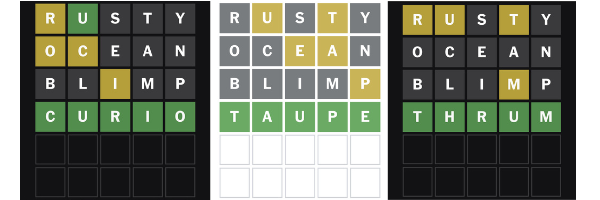RUSTY OCEAN BLIMP
Ventured Learning #30
Yes, that’s the real title. And no, I haven’t lost my mind. Stay with me, there’s a valuable lesson here.
RUSTY OCEAN BLIMP is the name of a system I created. And like all good systems, it came from trying to solve a problem that didn’t need to be that hard.
Enter the game of Wordle; the wildly-popular logic puzzle. I, like millions of others, enjoy the brief daily mental workout it provides. But for a while, I found myself struggling through it—guessing wildly, overthinking, and relying too much on luck or flashes of inspiration.
Then it hit me: I was trying to solve the problem with talent and effort. And like most things in life, that approach sometimes works—but not reliably. So I built a system.
RUSTY. OCEAN. BLIMP.
Use those three words as your first three guesses in Wordle, and here’s what happens:
You cover all five vowels
You hit 15 of the 26 letters in the alphabet
You receive multiple clues of what letters will stay and where they will be located
After those three inputs, you’ve collapsed the complexity of the game. The odds shift massively in your favor. I can’t recall the last time I failed to get the correct answer when using this system.
That’s not a statement of achievement. It’s just the result of good design and a great example of how systems beat talent.
Most people try to win at life through effort, hustle, talent, or intuition. And sure, those can get you far. But they’re also exhausting. They’re inconsistent. And eventually, they break down.
Systems scale. Hustle burns out.
This is true in business. In parenting. In investing. In anything that requires sustained focus and repeated decision-making.
The people who consistently succeed over a long period of time aren’t winging it. They’ve built frameworks. Checklists. Routines. Feedback loops. Systems that reduce friction and increase their odds of success.
If you’re solving the same kinds of problems over and over—stop reinventing the wheel. Build a system instead.
Make it repeatable. Make it easy for others to understand. Then run it again and again.
The more you systematize the routine stuff, the more brainpower you free up for the deep work. The creative leaps. The human connections. Those are where talent, creativity and inspiration come in.
To be clear, this note is not about winning the game of Wordle. It’s about leverage. You don’t have to be brilliant to win the game. You just need a process that works, especially on the days you don’t feel brilliant.
If something feels harder than it should, it probably is. That’s your invitation to pause and design a better way. You’re not the problem; the process is. You’re ready for a system.
Ventured Highlight
Real world examples of applying systems to overcome challenge and reduce complexity are everywhere. One that has stood out to me for years comes from Ray Dalio and his firm, Bridgewater.
Dalio didn’t build a successful hedge fund, he built a decision-making machine. When problems came up, he didn’t just fix them. He documented them. When a great insight emerged, it wasn’t just remembered, it became a principle.
Over time, those insights formed the backbone of Bridgewater’s operating system. He published them, codified them, reviewed and refined them. Eventually, the system became so strong that algorithms—based on the principles—guided hiring, investing, and culture decisions inside the firm.
My favorite part of Dailo’s example is the term he uses to describe it: “idea meritocracy.” In other words, the firm’s success does not rely on human instinct or judgement. Rather, a set of repeatable, scale-proof rules that made complex decisions simple over time.
You don’t need to manage billions of dollars of invested capital to benefit from this. You just need to be willing to ask:
→ What do I (or my team) do often that could be systemized?
→ What thinking and decision making could I make repeatable?
Dalio didn’t scale hustle. He scaled insight. He turned beliefs into systems. That’s how you build something that doesn’t depend on you showing up at 100% every single day.
And that’s the point. Systems carry the weight, especially when you can’t.
To learn more about implementing this in your own life, I highly recommend the book Dalio published, appropriately named Principles.
Worth The Click
Important Change Is Systems Change: “Systems are long-lasting, widespread and resilient. We can push back on them with effort, but over time, the system usually comes out ahead.”
Forget About Setting Goals. Focus on This Instead: “Eventually, I began to realize that my results had very little to do with the goals I set and nearly everything to do with the systems I followed.”
What Really Makes Toyota’s Production System Resilient: “Its performance during the pandemic highlighted how less understood aspects of its system actually led to greater resilience and a better capacity to handle disruptions.”
I hope you found this note useful or at least allowed you to pause and be intentional for a moment. And remember – we always get more of whatever we focus on!
Best,
Dan Reilly


